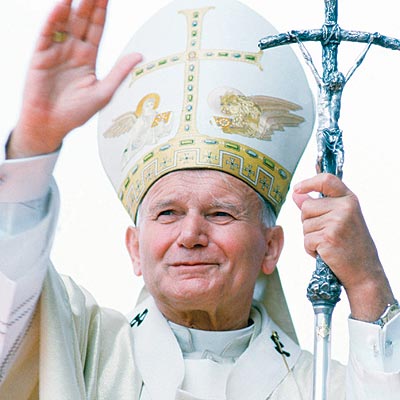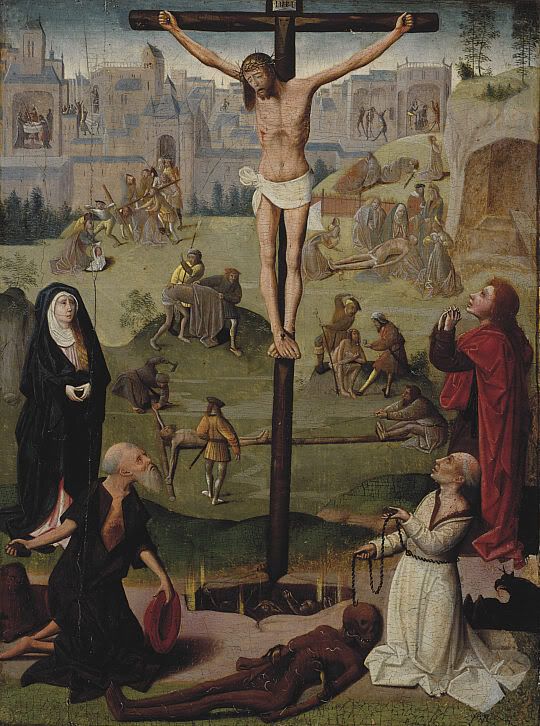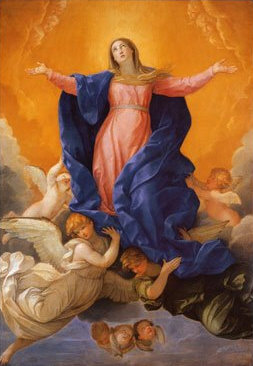This is a meditation By Mons João Clá Dias on Pentecost. The original is in Portugese and I have used Google transalte to convert it to Enlgish. I have tried to the best of my ability to correct some of the transalation issues. I hope that you will enjoy this meditation.
The descent of the Holy Spirit on Mary and the Apostles"The Spirit of the Lord filled the entire universe, he holds together all things and knows all Alleluia! - (Sb 1, 7)
Introduction:
For three years our Lord had prepared the apostles and disciples, for the great mission to spread the gospel throughout the world. Imagine the largest and most renowned teachers, the wisest and most capable that history has known, does not compare with Jesus Christ, who besides being the Master Teacher, God, the Second Person of the Holy Trinity, the incarnate Word of God, the God-man, he is the very Wisdom Incarnate.
The Divine Master had given them the doctrine, the power to forgive sins, the power to perform miracles; therefore they had all the elements to fulfill the great mission, however, they felt insecure, because it is not proportionate to that thought. So waiting for the special assistance that had been promised by our Lord: "you will receive power of the Holy Spirit has come in you and are witnesses to the ends of the earth: (Acts 1:8). We then gathered before our eyes, gathered in prayer in the Cenacle, the Virgin Mary, Holy Mother of God, the 12 Apostles, over 120 students waiting for the Counselor for excellence and dispenser of heavenly gifts.
Prayer Starter:
Come Holy Spirit, fill the hearts of your faithful and kindle in them the fire of your love! O Holy Spirit descended into the upper room on the apostles and their disciples, operating on them the most wonderful transformation, come on us with the abundance of your gifts and fruits ... Purify our hearts from everything that separates us from Thee.
Oh! Blessed Mother, Queen of Apostles, Virgin and Spouse of the Holy Spirit we will begin this meditation to make reparation to your Immaculate Heart, in the certainty of its complete triumph. We beg you, Madam, give us a spark of your love to meditate on this mystery of Pentecost.
Amen.
I - The origin of the feast of Pentecost.
It is originally a Jewish feast that was celebrated fifty days after Easter.
This feast was established by Moses, to remember the liberation of the Jewish people from bondage in Egypt. On this occasion, God told the Hebrews to sacrifice a lamb, from Egypt toward the promise land... It was a pre-figure of the Lamb of God - Jesus Christ - commemorated in the New Law, which would free men from the bondage of sin. On the fiftieth day after Easter, the party offering the first fruits of harvest - Pentecost - gave up the descent of the Holy Spirit.
Andon the day of Pentecost, they were all together in one place and suddenly there came from heaven a noise like a rushing wind blowing, and filled the whole house where they were.
Some appeared to them divided tongues of fire like which rested on each one. They were all filled with the Holy Spirit and began to speak several languages as the Spirit gave them utterance. (Acts 2, 1-4)
This coming of the Holy Spirit, brought to the church an extraordinary event. It has lent strength to the Church of Christ to overcome the obstacles by which they had to pass: The Apostles had to face death, would face lack of human respect, would have to bear witness to Jesus Christ in the midst of the greatest persecution, the greatest repulsions, suffer horrors of all kinds and therefore needed strength.
The Church as a tender baby ... The Church was born, it was forming, it was still like a baby, it had not yet reached adulthood. It correlates with what is happening at the Sacrament of Confirmation. When we receive the baptism, we begin to participate in the divine life we receive graces and gifts that are infused into our souls. However we do not have sufficient fortitude, temperance and so many other gifts and virtues to face adversity. And so that is how it was the early Church, gathered around the Cenacle of Our Lady, the Apostles were extremely fearful.
We must remember that when Jesus was resurrected and appeared in the Upper Room, He found the doors and windows locked because of the fear that something bad might happen to them (the apostles). Our Risen Lord said three times: Peace be with you! This peace that only reaches its fullness coma descent of the Holy Spirit.
II-The signs of the descent of the Holy Spirit
The effects of the descent of the Holy Spirit are impressive: It is heard as a strange noise, coming from the
sky, like that of a rushing mighty wind, while on the head of each apostle rested a tongue of fire.
The noise that comes from heaven, a mighty wind, signifies the fullness of the gifts that He would bring, such fullness, making the apostles suitable for the works of God. They receive the impetus of love and at the same time is manifest the greatness of God.
The Holy Spirit descends with his gifts filling the apostles with comfort, excitement, they feel transformed. It was what, centuries later, St. Therese of Child Jesus said: "To love nothing is impossible!"
They were full of God's Love, they who were once fearful of the high mission which they had been given, are now full of eagerness, enthusiasm, or filled with God.
St. Cyril of Alexandria, says of the transformation that took place: "Easily the Spirit makes the move from love of earthly things to the hope of heavenly realities, and the fear and indecision to the strength of strong and generous soul. This was the case with the disciples, animated and strengthened by the spirit, never to be intimidated by Her pursuers, remaining inseparably united and faithful to the love of Christ.
1 - Mary, Queen of Apostles, Mother of the Church.
When the Angel Gabriel appeared to Mary and announced to her a dignity more sublime than all the grandeur created: to be the Mother of God, on this occasion the Blessed Virgin received the fullness of grace and unspeakable that demanded perfection. Mary received both the noble and difficult mission to contribute to the redemption of mankind, that guaranteed Him lights, gifts, privileges offered to this important vocation. Now, at the time that the Church was to be revealed to the world,
spreading the Gospel, etc.. It was essential that She also received a new fullness of the Holy Spirit to be the Mother of the Mystical Body of Christ.
2 - The tongues of fire!
The most characteristic is that it is appropriate to register the tongues of fire. They had to preach and it symbolizes that the facility would have to express, to explain the doctrine of Our Lord, the ability to proclaim, to illustrate, to point, to teach the way of salvation. We know the first preaching of St. Peter, a beautiful sermon, whose results were 3,000 people converted. The Church is born with three thousand baptized on this day of Pentecost.
3 - How was this fire!
In daily life, we know the fire produced by cooking gas, for firewood in the oven, etc.. And we feel that this is the fire that exists in hell fire and took this as a bad thing harmful, like a fire that scorches. It happens that the fire of hell has no fuel material, it is sustained by God Himself. The same happens with the fire of Purgatory. But the fire of the earth can be useful, because what would we be if we did not have the fire in our lives, how would we make our meals? For these reasons some believe that in heaven there is no fire.
According to some theologians, the heavenly paradise there is fire and that fire from heaven is all beautiful, beneficent, is rejuvenating a fire, a fire is extraordinarily charitable benefit to us, the fire in the sky is fragrant!
The fire, made of light and heat, was the best element to symbolize the burning itself to restoring and exciting action of the Holy Spirit. By hovering over the heads of Mary and the others present, the flames were presented in the form of tongues of fire. In them we see the flames symbolized that the preaching of those men would pose. Thus, these tongues of fire that descended upon the Apostles is fire from heaven, carrying highly charitable, they symbolize the gift of eloquence, charm, enthusiasm, fervor that they should have to convert all peoples.
4 - strong wind,
The "strong wind" can be seen as the arrival of the flood of grace which were being poured, flooding to flush the fire room of the Cenacle. Where effective and mystical graces overabundant that "invaded" the room, pointing to the fullness of faith and love which suited the heralds of the Word of God. In addition to auditory phenomenon, and perhaps sensitive, there have been some perfume? The idea seems plausible.
III-Send forth your Spirit Creator!
The modern world is in a stunning decline. Men seem to be deaf to the voice of the Holy Spirit and if ever fall deeper into sin and forgetfulness of God, we see so much evil, violence and horrors of all kinds making progress scary. Enough that we beseige Our Lord, the prayers of Mary, send the Spirit of Truth and Love on Earth to be reversed this situation and the complete defeat the powers of hell.
Therefore, the Church in the person of his faithful, pray for twenty centuries the prayer of the Psalmist:
"Send forth your Spirit and renew the face creator of the earth"
What wonders what could still come after this event? If in the first coming there were so many beauties of culture and civilization, and especially so many miracles of grace - witness the long cohort of martyrs, confessors, virgins and doctors who already enjoy in eternity - what would happen if there was a new lease of the Paraclete on earth?
That is why we beg, insist that the Holy Spirit to restore order and renew the face of the earth, to close this meditation in reparation to the Immaculate Heart of Mary
Closing Prayer
Oh! Queen of Apostles, Queen of Peace, our heavenly Mother full of the love of God, we contemplate in this meditation the key role of this mystery of Pentecost, as Mediatrix of God which has been the coming of the Third Person of the Trinity so magnificent that transformed all the Apostles, the disciples and began the Holy Catholic Church. However, Madam, today we are in a worse situation than those times, all that Thou ask Thou received, now also ask, ask the Bride of the Holy Spirit and that He will come to convert sinful humanity so we can sing and proclaim rejoicing the song of your victory: your Immaculate Heart triumphed!
Amen!















